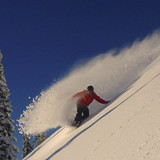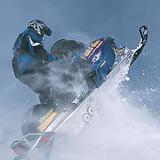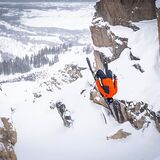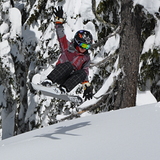Welcome to the Ski USA page, providing a regular round-up of the skiing conditions and current snow reports for the main ski resorts in the United States. Over recent years some of the best and consistent piste conditions have been reported at Aspen (Colorado), Alta (Utah), The Canyons (Utah), Winter Park (Colorado), Big Sky (Montana) and Jackson Hole (Wyoming). However, in any given week or season the best slope conditions may be found at a number of other North American resorts so keep an eye on the snow forecasts and reports if you are planning a last minute trip.
For off-piste powder, Alta, Aspen, Big Sky, The Canyons, Winter Park and Loveland have proven among the most consistent in the country over several seasons but check out the reports below for the latest news.
For big snowfalls and accumulated snow depths the Californian resorts of Squaw Valley and Mammoth feature strongly in the records as do the dry powder resorts of Solitude, Alta and Snowbird. Timberline in Oregon also has an enviable snow record.
With more than 500 ski areas spread across some 38 US states, America is one of the world’s leading ski nations, clocking up around 50 million skiers on the slopes each winter.
US ski resorts are spread right across the country from East Coast to West. There are also resorts in Alaska and it’s sometimes possible to ski in Hawaii on the slopes of 4205m high Mauna Kea, although there are no ski lifts there.
You’ll find a great diversity of terrain when you ski USA from the comparatively low lying mountains of New England and the Blue Ridge mountains of Virginia to the south, to smaller hills across the MidWestern prairies, to the Rocky Mountains and Sierras on the West. The Rockies stretch over a mile above sea level at resort height in some cases, resulting in almost half of the 20 highest ski lifts in the world being located in Colorado.
What’s common to this diverse selection of ski areas, which range from small private hills owned by schools and military bases to major international resorts like Aspen and Vail famed around the world, is a dedication to high service standards. When you’re skiing USA these include high quality on the slopes with well groomed, normally uncrowded slopes with uplift generally provided by chairlifts, gondolas or cable cars (known as trams in North America) rather than drag lifts. Indeed the chairlift, as well as the hot tub, are both American inventions credited to Sun Valley in Idaho.
Some ski areas in the USA date back the best part of a century. Most were established by pioneers, often on a shoestring budget with just a simple tow lift converted from a car, lorry or even motorbike engine. But decades of gradual growth have led many of these original small, simple set-ups to become major international resorts – Mammoth Mountain in California is a good example of this.
Others were set up by emigrants from the Alps, most famously Cranmore Mountain Resort in New Hampshire which was established with help from Austrian downhill ski technique pioneer Hannes Schneider from the Austrian Arlberg who arrived in the US having refused to join the Nazi propaganda machine when they took over Austria in the 1930s. During the Second World War he helped train the 10th Mountain Division of the U. S. Army, some veterans of which also became resort developers after the war.
Famous resorts like Vail, now the largest ski area in the US, were established later with strong European involvement. Other resorts like Aspen and Breckenridge were former 19th century mining settlements that found a new lease of life when ‘white gold’ was struck.
Along with growth on the mountains, the 1990s and first decade of the current century saw a boom in resort ‘real estate’ developments with hotels, condominiums, shops and restaurants created at the bases of ski slopes which in some cases had previously only had car parks. This period – which slowed dramatically from 2008 due to the global economic situation – led to an era of corporations taking over from individual families, and currently four or five large companies own and operate around 50 leading US resorts between them.
In Eastern North America snowmaking developed in the 1950s and rapidly became an essential requirement at most of the ski areas in the region, leading to it becoming known as “the snowmaking capital of the world.”
In the West of the country, which is best known for its destination resorts particularly in states like California, Utah and Colorado, a major selling point is abundant, deep powder snow which is the norm if not always guaranteed. One of the snowiest places on earth are Alaska and Washington State in the North West of the country where falls of up to 50 feet (16 metres) can be recorded in one winter, more than any other ski region on earth.
Criticisms of US skiing from some, when compared to Europe, is that ski areas are mostly smaller, lift tickets more expensive, spectacular scenery is rare and the resorts and slopes are too sanitised and bland at some of the most corporately run areas. The kind of family run, home-cooking small mountain hut is quite rare in the US where large cafeterias serving fast food are more common. However many of these ‘flaws’ for some are seen as assets by others, which when combined with the other points listed in this article combine to make the US ski experience the best on earth.
And despite the well groomed pistes, many resorts have built reputations for challenging off piste terrain, including Jackson Hole in Wyoming, Alyeska in Alaska and Squaw Valley in California.
The country’s positive attitude to children is also seen as an asset for families in most cases, with children praised for their efforts in nursery and ski school.
The US is also the home of snowboarding with Jake Burton inventing the sport in Vermont in the late 1970s. Stratton there has organised snowboarding contests longer than any other. However the country is also home to three resorts that still ban snowboarding: Alta and Deer Valley, both in Utah, and Mad River Glen in Vermont.
read more...
 Ski USA
Ski USA







